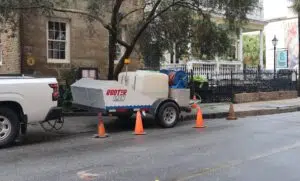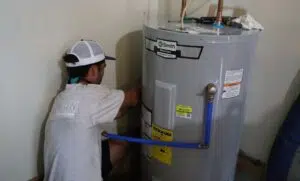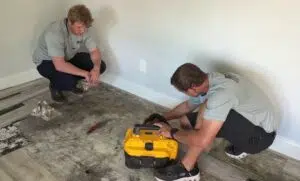While plumbing emergencies usually appear to come out of nowhere, in reality they are nearly always the culmination of weeks, months, or years’ worth of slowly growing problems. Unlike the more visible elements of a home’s infrastructure, however, the bulk of the plumbing system is hidden from view and can escape inspection by the homeowner until a destructive event demands their attention.
Those homeowners will be glad to learn, however, that there are some clear warning signs to look out for and some steps they can take to identify growing issues before they result in a catastrophic and expensive plumbing disaster.
Potential Emergencies
A failing plumbing system can cause great damage in a very short amount of time to various parts of your property. Here are the primary three categories that are negatively affected by a plumbing system that is neglected for too long.
Home Damage
Most of the interior of your home, such as the insulation, wood framing, ceiling materials, and carpeting, are not built to withstand a large amount of water. That’s even more true of your furniture and other possessions that you value that are stored inside your home. A burst pipe or major leak can cause flooding on the ground floor, and when damaged plumbing is on an upper floor, it jeopardizes elements on both that floor and lower floors, as water permeates the flooring and drips through to the ground floor.
Landscaping Damage
The telltale feeling of sponginess underfoot is often the unmistakable signal that there is a plumbing emergency affecting your yard. As water escapes from a burst pipe in large quantities, it fills the soil and can cause major erosion in a short amount of time. More critically, such a plumbing emergency nearly always requires the use of digging equipment to uncover the damaged pipes and replace them. This obviously transforms the property for the worse and necessitates regrading, reseeding, and replanting of any larger plants or trees that are disturbed by the work.

Expensive Repairs
A minor leak may cost you as the homeowner a certain amount to repair, but inevitably procrastination causes the final bill to rise dramatically. Correcting a small plumbing problem before it reaches the breaking point is always far less expensive and disruptive than waiting until it has caused water, soil, and/or waste to overflow into your living space and landscaping. A regular schedule for plumbing maintenance could quite literally be the difference between having to replace the majority of the furniture, flooring, and paint in your home after a plumbing failure.
Causes of Plumbing Damage
Fortunately, the materials used in our homes’ plumbing systems are carefully chosen, engineered, and combined for one purpose–in short, to keep water inside them as long as possible. There are, however, some important long-term and short-term factors that take a toll on plumbing materials.
Age
All infrastructure deteriorates over time, and plumbing pipes are no exception. There is a unique issue to be aware of with older homes, and that is the possibility of pipes built from materials that are more vulnerable to corrosion than newer materials. These mainly include cast iron and galvanized pipes, which rust more quickly than modern PVC and copper pipe. Combine that with an estimated 50 years of reliable service, and many older homes are in significant need of a plumbing system upgrade. If you aren’t sure what your home’s pipes are made of or you suspect they could be suffering from corrosion, it’s critical to have a professional service do an inspection.

Infrastructure
Inside your home, your plumbing system is supported by infrastructure of its own. In a basement or crawlspace, for example, you are likely to find metal hangers securing your pipes to the ceiling. When these metal hangers rust, break, or tear loose from floor joists, the pipe experiences much more pressure as more of its full weight hangs in the air. This added pressure can cause joints to wear out and pipes to crack in time. Replacing these hangers and having professional plumbers incorporate effective ways to support pipes in a better way will extend their life and keep your home safe.
Erosion
Outside the home, your plumbing pipes are supported not by hangers, but by the soil underneath your lawn. Soil erosion is an incredibly complex process, and while home builders do their best to minimize it at the time of new construction, there will inevitably be some shifting of dirt and rocks under the influences of rain, time, and later landscaping changes.
When the dirt underneath a pipe gets washed away, that allows the pipe to sag under its own weight and that of the water inside it. This can allow a pipe to break in time without even suffering direct damage from tree roots, digging equipment, or other more obvious sources of danger. In most cases, it is impossible to detect this issue from the surface without the help of professionals who know what to look for.
Cleaning Products
Many homeowners are surprised to learn that drain cleaners can damage their plumbing. It’s true that chemical based drain cleaning products are a great way to quickly clear up a pipe clog, but large quantities over time will take a toll on the pipe materials themselves. Drain cleaners consist of very caustic chemicals designed to eat through all sorts of substances, and when pipes are exposed to them extensively, cracks and holes can form.
Warning Signs
How can you tell that there is something wrong with your plumbing? The biggest part of the mystery for homeowners is the fact that they can’t see most of their plumbing system, and it’s easy to assume everything is working as intended. While the best way to spot a problem is to have expert plumbers like Rooter-Man SC pay a visit to your home, there are a few things that sharp-eyed and sharp-eared homeowners can monitor for.
Odd Noises or Odors
Most often described as “knocking,” pipes sometimes produce sounds that are hard to nail down and are often misidentified by children as ghosts causing mischief! In most cases, these knocking sounds are the result of pipes shaking under high or inconsistent water pressure and bumping against walls, other pipes, or the infrastructure holding them in place. Another source of “knocking” is water running into a valve that is suddenly closed. These sounds are indications that something is insecure in your pipes, and if they are not addressed, the wear and tear on the pipes will lead to larger problems.
A new unpleasant odor is often a warning that sewage pipes or kitchen drains are not taking waste out of the house as quickly as they should. Besides the objectionable smell, this could indicate an impending waste water disaster without emergency plumbing service.
Corrosion and Faulty Valves
A hands-on and close visual inspection of the pipes that are visible will tell you a lot about the condition of the pipes that you can’t see as well. Is there visible rust/corrosion on the plumbing systems underneath your sinks, connected to your toilets, or in your garage/attic/basement? If so, there is most likely much more corrosion hidden from view. If it is difficult or impossible to turn the valves at your sinks and toilets, that’s also an indication that your pipes are suffering from corrosion.

Leak Evidence
Are you noticing water on the bathroom floor, inside cabinets, or in random places around the house? Don’t ignore it! These puddles are huge warning signs that a pipe is compromised and leaking, at least occasionally. In addition to indicating a faulty plumbing system, this problem can also cause mold/mildew growth as those areas suffer from prolonged moisture.
Solutions
We say it so often that we know people get tired of hearing it, but it’s that important! The ultimate solution for plumbing problems that may be growing underneath your floorboards and landscaping with little to no warning is a regular plumbing inspection schedule. Having a plumber visit your home several times and correcting very minor issues will cost you far less than the bill for remediating a plumbing disaster. You’ll also avoid the hassle of replacing flooring, furniture, etc., and possibly even the need to find temporary housing while your home is repaired.
Not every plumbing issue results in a large-scale catastrophe, of course, but it is possible, and as with most of your home’s infrastructure, regular maintenance preserves your plumbing longer and saves you money in the long run. Your plumber can also let you know when a large-scale replacement of pipes, a new water heater, a garbage disposal replacement, or other major items are needed within the next few years, giving you the liberty to plan and work it into your family’s schedule and budget rather than scrambling to get the work done in an emergency situation.
The other critical step is to respond to any of the warning signs we’ve listed here with urgency. Don’t let leaks, odd sounds, or obvious plumbing malfunctions stay on your “back burner.” Call Rooter-Man for plumbing in Charleston, SC right away and have our expert technicians diagnose and correct your plumbing problem as quickly as possible.







